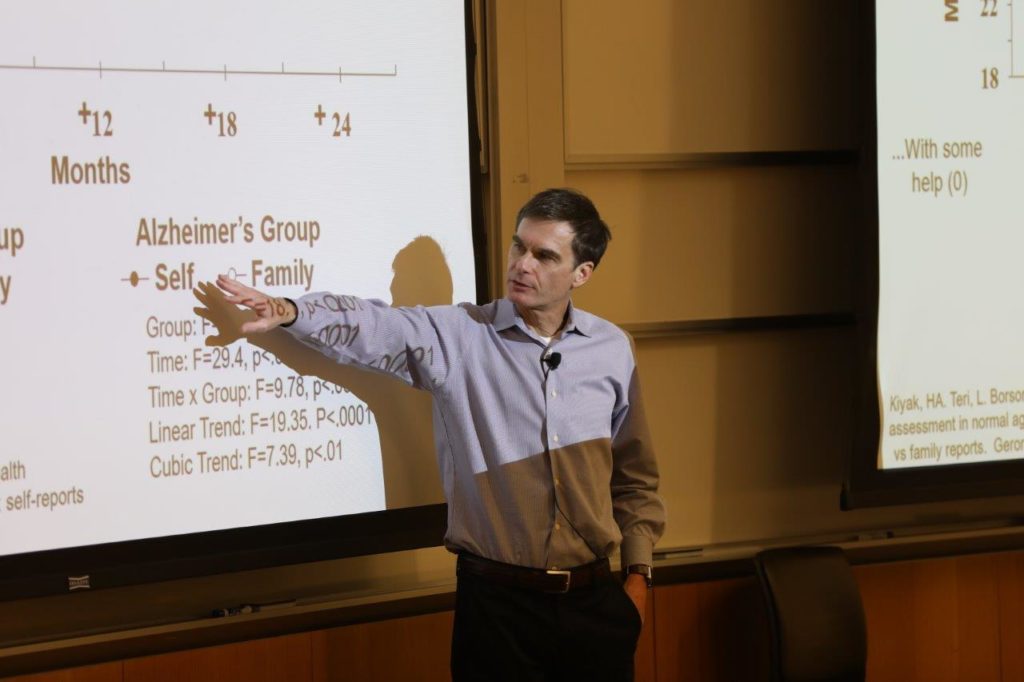
Dr. Jason Karlawish addresses the Securities Industry Institute at The Wharton School. (Photo by SIFMA.)
By Joyce Lee
Dr. Jason Karlawish, co-director of the Penn Memory Center, challenged financial professionals to act to prevent elder financial abuse at the recent Securities Industry Institute (SII) conference hosted at the Wharton School.
The financial industry is poised at the front line of detection and prevention of financial troubles brought on by aging and by neurodegenerative disease and should take action to protect the wealth and health of their clients, he said.
According to the Employee Benefit Research Institute, an aging America faces financial challenges such as the shift in retirement plans from monthly checks to lump sum payments, the rising debt levels among older adults, and the increasing need for (and inadequate funding of) long-term care.
“This is a set of circumstances ripe to balloon,” Patrick T. Harker, president of the Philadelphia Federal Reserve, noted back in November at a conference on aging, cognition, and financial health.
Whealthcare is meant to address these challenges, Dr. Karlawish said. To protect the health and wealth of older adults, whealthcare looks to form stronger ties between the financial and medical industries to combat elder financial abuse.
Aging can make older adults more vulnerable to financial fraud and mismanagement. Fluid intelligence, which includes the ability to learn new tasks and manage money, deteriorates as a person advances in age, irrespective of disease. But if a person later develops a neurodegenerative disease like Alzheimer’s disease, the worsening of cognitive abilities can become even more pronounced.
Such cognitive decline can make older adults more susceptible to financial scams, which might trick them into thinking they won a lottery or that their friend is in financial trouble. This could also result in victims’ ill-intentioned family members or friends taking advantage of their cognitive decline to take control of their assets through financial abuse.
Often, troubles with money are the earliest signs of cognitive decline and come before a formal diagnosis is made. Dr. Karlawish notes that this is further complicated by the idea of preclinical Alzheimer’s disease, a term emerging in the medical field that describes people who do not have the cognitive symptoms of the disease yet but have biomarker evidence (e.g. genes or abnormal amyloid levels) that indicate they are at high risk of developing the disease in the future.
“Imagine that you have a client that comes in and knows [he has] preclinical Alzheimer’s. What would you do to help him to plan and manage his life?” Dr. Karlawish pitched this question to the financial professionals at SII. “He now knows something very particular about himself, what he will be, and what he needs.”
Such planning and management is at the core of what the financial industry should do in terms of whealthcare. And recent advances are indeed making changes to combat financial abuse of older adults, such as Rule 4512 released by the Financial Industry Regulatory Authority (FINRA) that asked for information to be collected on trusted contacts in client forms. This is similar to what the medical field has been doing for years, in terms of emergency contact information. Like the acronym KYC (Know Your Client) that is pervasive in the industry, we could use the acronym KYTC (Know Your Trusted Contact), Dr. Karlawish noted.
But these advances are only the first step. If you really want to practice whealthcare, Dr. Karlawish said, you have to think at the level of relationships with individual clients, and not just at the community and society level, where laws allow for these actions to take place.
Next steps for firms to consider could include developing new technologies to monitor transactions, creating a scorecard for whealthcare efforts, engaging in conversations with clients on privacy, and maintaining an open system for communication. The financial industry should pivot from using a “risk management perspective” to a “business perspective” in looking at this issue, Dr. Karlawish added.
Specifically, communication with clients is key. Citing studies that looked at how people with cognitive impairments make decisions, Dr. Karlawish asked finance professionals to consider “the ways you want to ask someone questions to get a sense of [if] they know what they’re getting into, [if] they see the upsides and downsides [of their financial decisions].”
“It’s not about having long conversations,” Dr. Karlawish said, “it’s about having effective conversations when you know how to listen as well as how to speak.”
The Securities Industry Institute is a collaboration between the Wharton School of Business and the Securities Industry and Financial Markets Association (SIFMA) that is held yearly for the professional development of securities professionals.